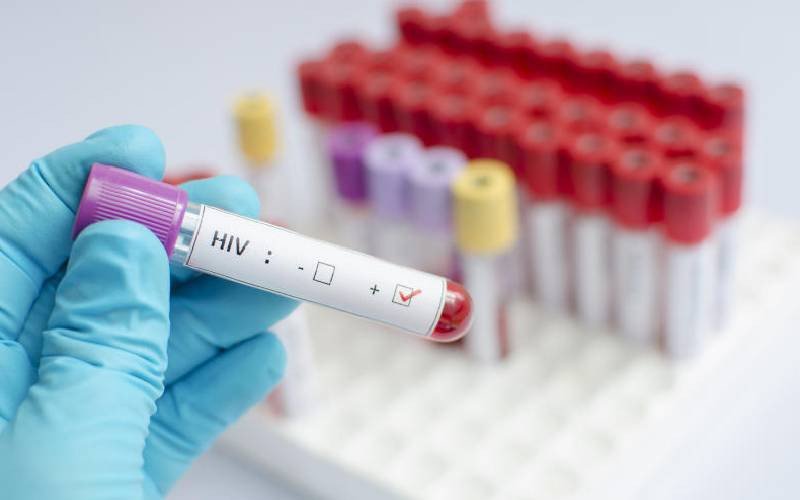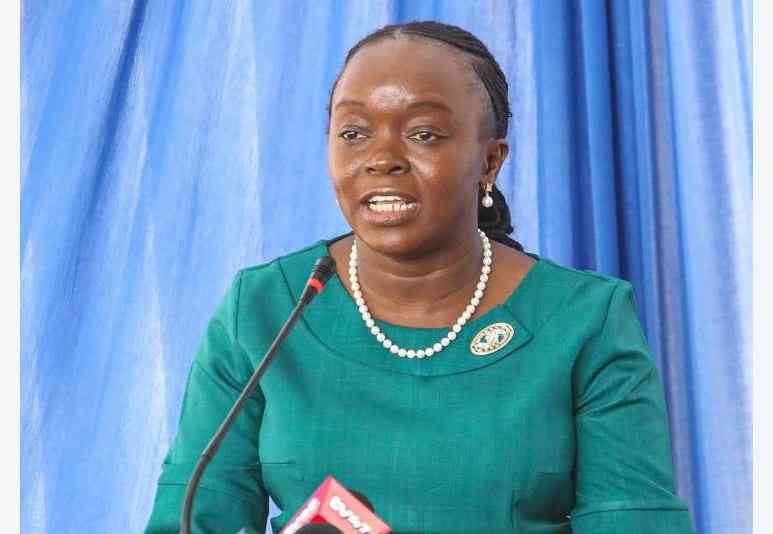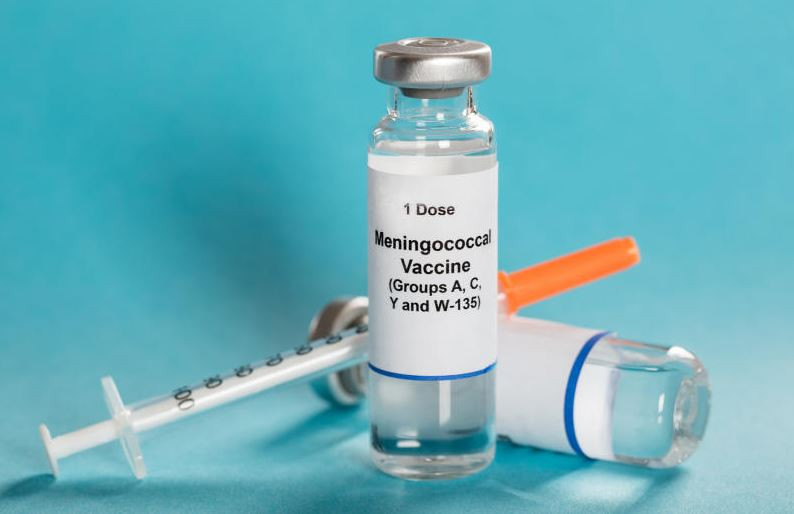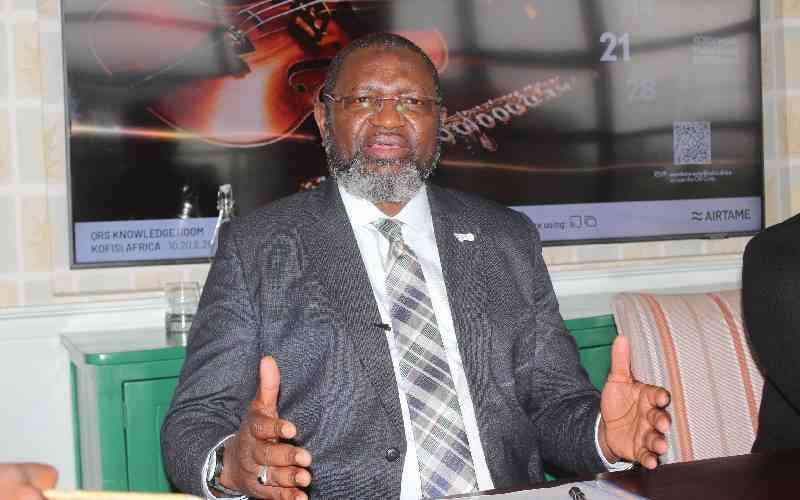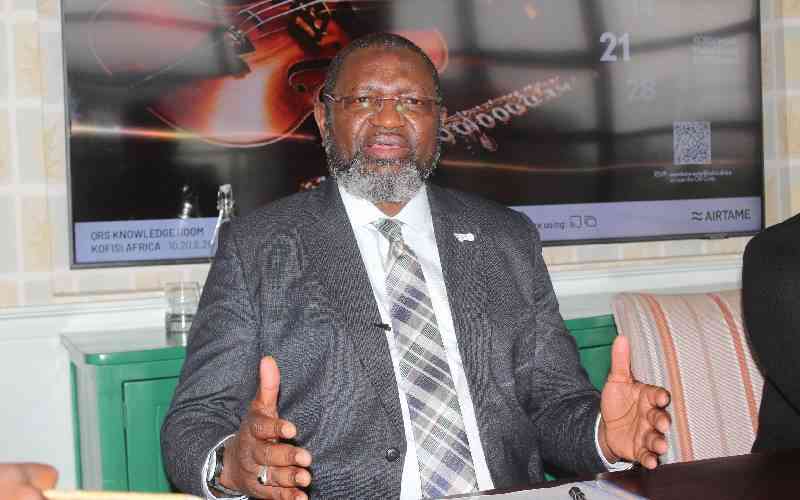
VillageReach CEO Ahmed Ogwell during deliberations with Ministry of Health officials and stakeholders on health system strengthening amid reduced foreign aid support. [Benard Orwongo, Standard]
Kenya must rethink how it finances and delivers healthcare to communities to ensure sustainability, especially as foreign aid dwindles, health experts have warned.
Speaking during the 25th anniversary celebration of VillageReach, a global health organisation working across Africa, the experts underscored the urgent need for efficiency, stronger partnerships, and locally driven models to secure the future of healthcare.
VillageReach chief executive Ahmed Ogwell said Kenya and other African countries must focus on making better use of the resources they already have before seeking additional funding.
“We are currently witnessing a lot of wastage—in planning, delivery of services, collection of data, delays in analysis, and utilisation of information,” he said. “If we were more efficient with what we have, we would already be steps ahead.”
According to Dr Ogwell, inefficiencies are most visible at the community level, where multiple players often run fragmented projects that duplicate efforts.
The expert cited training of community health promoters (CHPs) as a common example, with different organizations conducting parallel programs instead of coordinating to achieve longer-term impact.
- Ruto: Digital SHA system to curb fraud, expand universal health coverage
- PS: Private hospitals risk shutdown for denying SHA services
- Uproar after SHA flags hospital payment list as fake
- Government eyes student enrollment to boost SHA uptake
Keep Reading
Procurement bottlenecks also drive waste.
“The procurement process for medical commodities is so lengthy that it delays access to essential supplies. If procurement were smoother, health systems would access products and services faster and at lower costs,” he explained.
To strengthen health systems, Dr Ogwell emphasized the need for synergy in financing.
Currently, health resources flow from multiple sources—government budgets, out-of-pocket payments, development partners, and the private sector, but often fail to align for maximum impact.
“All resources should work in synergy to produce the best impact. That synergy has not yet been reached,” he said, urging governments to take the lead in coordinating financing flows.
Health reforms
He warned that the sharp reduction in external aid had left many health initiatives struggling, exposing the fragility of systems that depend heavily on donors.
“For a long time, delivery of healthcare in Africa has been left to external players rather than governments. That strategy lacked sustainability, and the gaps are now clear,” he said.
Kenya Kwanza administration had promised to implement the Universal Health Coverage (UHC) policy.
To enhance this, the government is working on health reforms like Social Health Authority (SHA) that is UHC financier.
Health budget for the country remains low, with greater dependency on donors in HIV, Tuberculosis (TB) and malaria programs.
The projects are among those greatly affected with the recent freeze on foreign aid by the US government.
Experts caution that unless Kenya consolidates domestic financing and reforms delivery models, progress towards UHC could stall.
Ogwell said African governments must rethink service delivery to fit the continent’s realities.
“Most models are energy-intensive, infrastructure-heavy, and training-intensive, yet many of our countries lack electricity, proper infrastructure, and sufficient health workers. We need people centered approaches where delivery per unit is cheaper and sustainable at the community level,” he said.
He called for governments to prioritize local resources—including domestic budgets, private sector investment, and household contributions—while treating foreign aid as supplementary.
“Financing of the health sector needs to be local. If we do not develop African-centered models, we will continue struggling with high unit costs of delivering healthcare,” he added.
Public Health Principal Secretary Mary Muthoni echoed the call for sustainable health systems, reaffirming the government’s commitment to UHC and highlighting the central role of partnerships.
“In Kenya, the vision of UHC is not just a policy objective—it is a promise we have made to every citizen,” she said. “True UHC is not only about financial protection, but about ensuring that quality healthcare is physically available, accessible, and responsive to the needs of our people.”
Muthoni highlighted the Community Health Units as one of the pillars to UHC initiative, a partnership with VillageReach, Lwala Community Alliance, and others.
The program works to ensure essential medicines and supplies reach communities consistently, helping reduce the high rates of stock outs that undermine service delivery.
“Our Community Health Promoters are the heartbeat of our health system,” she said.
The ministry is equipping CHPs with training, digital tools, and resources.
She added that one key development in taking services closer to people is the integration of a commodity management module into the national electronic Community Health Information System (eCHIS) platform, enabling frontline workers to track and manage supplies more efficiently.
Muthoni announced that the government, with support from VillageReach, is transitioning the Covid-19 hotline into a permanent, multi-topic telehealth service.
“This is about turning a one-off emergency response into a sustainable public utility that connects Kenyans with health advice and referrals,” she said.
The PS cited the transition of the Polio Laboratory Sample Transport program and the establishment of a genomics lab at the Kenya Medical Research Institute (KEMRI), which will serve as a regional hub for disease surveillance and strengthen cross-border preparedness.
Muthoni applauded VillageReach for aligning its interventions with government priorities and for championing sustainable, locally integrated solutions.
“Your focus on working with communities and government—not around them—is a model for effective development,” said the PS.
Experts stressed that the path to sustainability lies in aligning resources, reducing wastage, and building systems that reflect Africa’s unique challenges and strengths.
“Our work is far from over,” said Muthoni. “Let us continue to build a health system that is not only resilient to future shocks but deeply responsive to the daily needs of every Kenyan.”
Dr Ogwell added that the solution lies in responsive primary health systems rooted in local priorities and capacities.
“If we do not have African-centered models, we shall continue to face challenges in how much healthcare we can deliver per unit cost,” he cautioned.
 The Standard Group Plc is a multi-media organization with investments in media
platforms spanning newspaper print
operations, television, radio broadcasting, digital and online services. The
Standard Group is recognized as a
leading multi-media house in Kenya with a key influence in matters of national
and international interest.
The Standard Group Plc is a multi-media organization with investments in media
platforms spanning newspaper print
operations, television, radio broadcasting, digital and online services. The
Standard Group is recognized as a
leading multi-media house in Kenya with a key influence in matters of national
and international interest.

